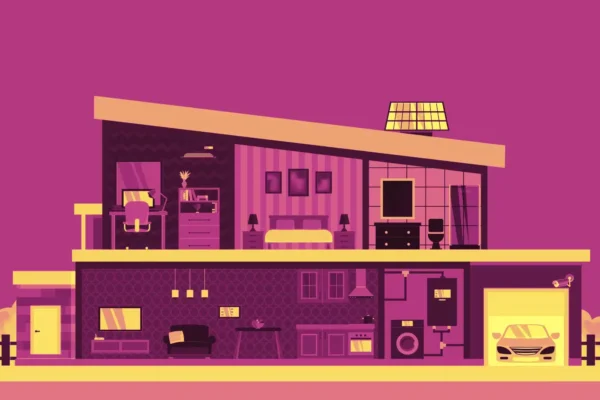
Ready for Your Next Home Improvement Project? Figure Out Your Bathroom Renovation Cost
Ready to tackle a bathroom remodel in your house? Maybe you’re trying to increase the value of your home before selling; perhaps you’re just tired of crouching beneath a too-low showerhead. Whatever your motivation, a well-planned bathroom makeover can take your space to the next level.
Heads up! It’s not an inexpensive project. HomeAdvisor recently placed the average bathroom remodel cost at $10,981, estimating a range between $6,599 and $16,389. And since the bathroom is a space that you (or your future buyer) will use daily, you’ll want to do it right the first time.
The two best ways to get it right on the first try? Set a budget and plan ahead! Here’s what you need to know about planning for your bathroom renovation.
Estimating Bathroom Renovation Costs
The nice thing about home renovation projects is that you can set the budget. You can go as luxurious or as simple as you want. No matter the size of your project, however, you’ll want to think about your total project costs before you start chipping away at old tile.
1. Determine what you want to upgrade.
First, consider what you want to change in your bathroom. Removing outdated wallpaper and adding a fresh coat of paint will cost a lot less than completely gutting the room and starting fresh. Here are some common bathroom upgrades to consider:
- New tub or shower
- Upgraded countertops or sink vanity
- New toilet
- New sink and faucets
- Wall and floor tile replacement
- New lighting fixtures
- Eco-friendly plumbing features
- Addition of accessibility features such as grab bars or walk-in tubs
Make a list of what you would like to change in your current bathroom and consider the materials you’ll need.
Put Your Home Equity to Work
Learn more about how you can take advantage of your home’s value.
2. Shop around online to estimate material prices.
Next, using the list that you wrote down in the last step, shop around online to get an estimate of local store prices for materials. It can be helpful to measure the size of your bathroom and calculate square footage to know how much you’ll need of materials like paint and tile.
3. Decide if you want to DIY or hire a professional.
Do you have a knack for home improvement projects? You might be able to do much of the work yourself. If not, this project will likely be best left to the professionals.
Labor expenses can cost just as much as materials, so don’t forget to include this in your estimate if you plan on hiring a contractor to help you with the job.
To estimate labor costs, contact a few local general contractors who can visit your home and give you a quote for the project. Getting a quote from a pro is also a great way to learn what, exactly, will go into the construction of your dream bathroom.
4. Consider additional costs.
Small things add up quickly, so you won’t want to forget about costs like:
- Permits: Depending on where you live, the involved utilities, and the size of your home improvement project, you may need to obtain a building permit.
- Disposal of materials: Some old items from your bathroom may be too large or hazardous to put in your garbage can for pickup. Account for any waste you may need to pay extra to dispose of.
- Delivery of materials: Don’t have a truck to bring your vanity to your house from the hardware store? Delivery costs can add a significant amount to material costs, depending on the size of the items you’re shipping.
Some of these expenses— such as waste disposal— are often factored into a general contractor’s quote. Always ask your contractor what their quote includes.
5. Plan for unexpected expenses.
If there’s one rule of home improvement projects, it’s to expect the unexpected. You may remove your old shower only to discover extensive water damage underneath that must be addressed before you install a new tub. You may find mold growing underneath your old tile. A general contractor may discover that something in your 1970s bathroom isn’t quite up to code anymore.
There are a number of issues that can arise or projects that take longer than expected, so it’s always smart to factor in an extra contingency in your budget. Most experts agree that you should budget between 10% to 20% of the total project cost for unexpected problems.
6. Tally up your numbers.
Lastly, tally up the numbers to get your final estimate. Keep in mind that this isn’t a number set in stone. Your total project price could end up being more or less depending on a variety of factors. It will, however, be a good place to start from.
Financing Your Remodel with a Bathroom Renovation Loan
Worried about having the cash on hand for a bathroom remodel project? Luckily, you can finance it with one of several options.
Home Equity Loan
A home equity loan is a type of loan that is secured by the equity you have in your home. By using home equity to back the loan, borrowers can get low interest rates, which can save hundreds— if not thousands— of dollars in the long run.
Home Equity Line of Credit
A home equity line of credit (HELOC) is another great option for a bathroom renovation loan and is very similar to a home equity loan. However, instead of receiving funds in one lump sum, you borrow money as you need it, much like a credit card. Like a home equity loan, borrowers benefit from a lower interest rate. However, interest is only paid on the actual amount borrowed— not the entire amount that you’ve been approved for.
Home Improvement Loan
Home improvement loans are unsecured loans designed for covering the costs associated with materials and labor for home improvement projects. These can be a great option for homeowners who don’t have enough equity built in their home for a home equity loan or HELOC.
Cash-out Refinance
A cash-out refi can accomplish two things at once: give you the funds for your remodeling project and save you money with a better interest rate for the rest of your loan.
With a cash-out refinance, you will essentially pay off your existing mortgage with a larger loan that has more favorable terms. You’ll get to pocket the difference between your new mortgage and the existing mortgage and use this money at your discretion— like putting it towards a bathroom remodel.
Get Started on Your Bathroom Improvement Project
A bathroom remodel is a project that can improve your quality of life in your house and boost your resale value when it comes time to move.
Ready to get started on your renovation? Get your financing squared away first. Take the first step today and reach out to your local credit union to learn more about your financing options and which is best for your financial situation.


